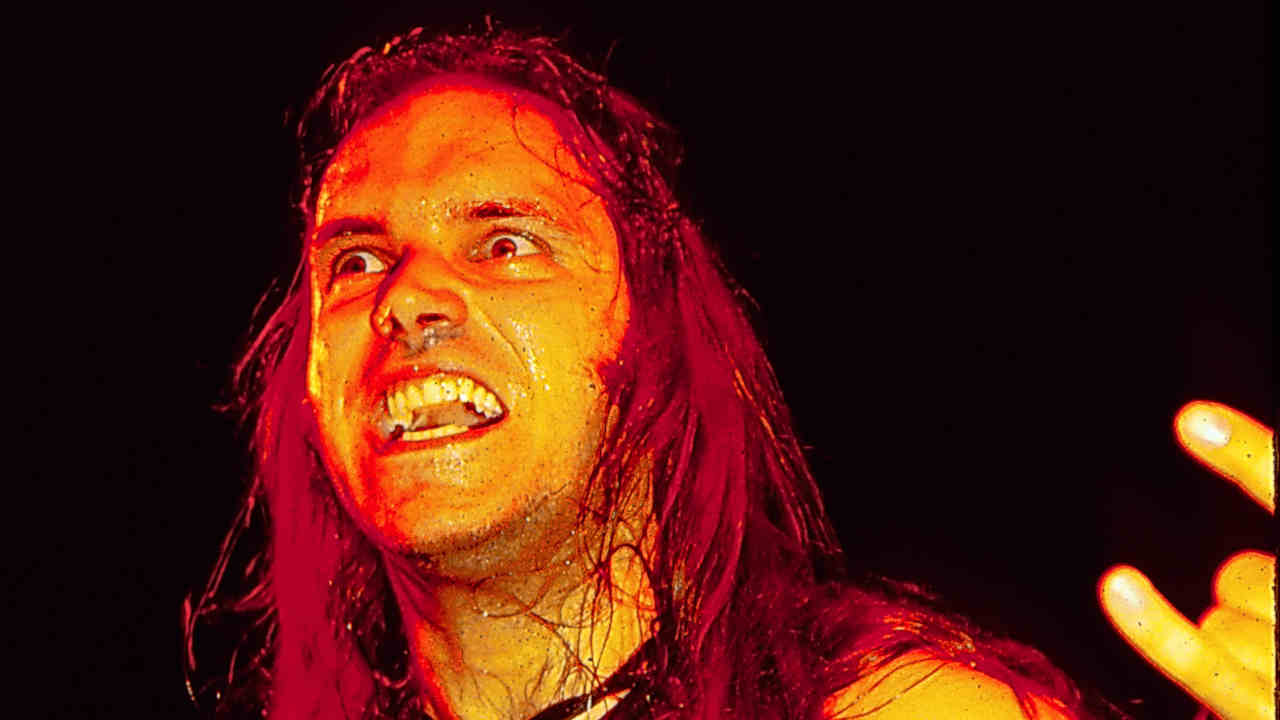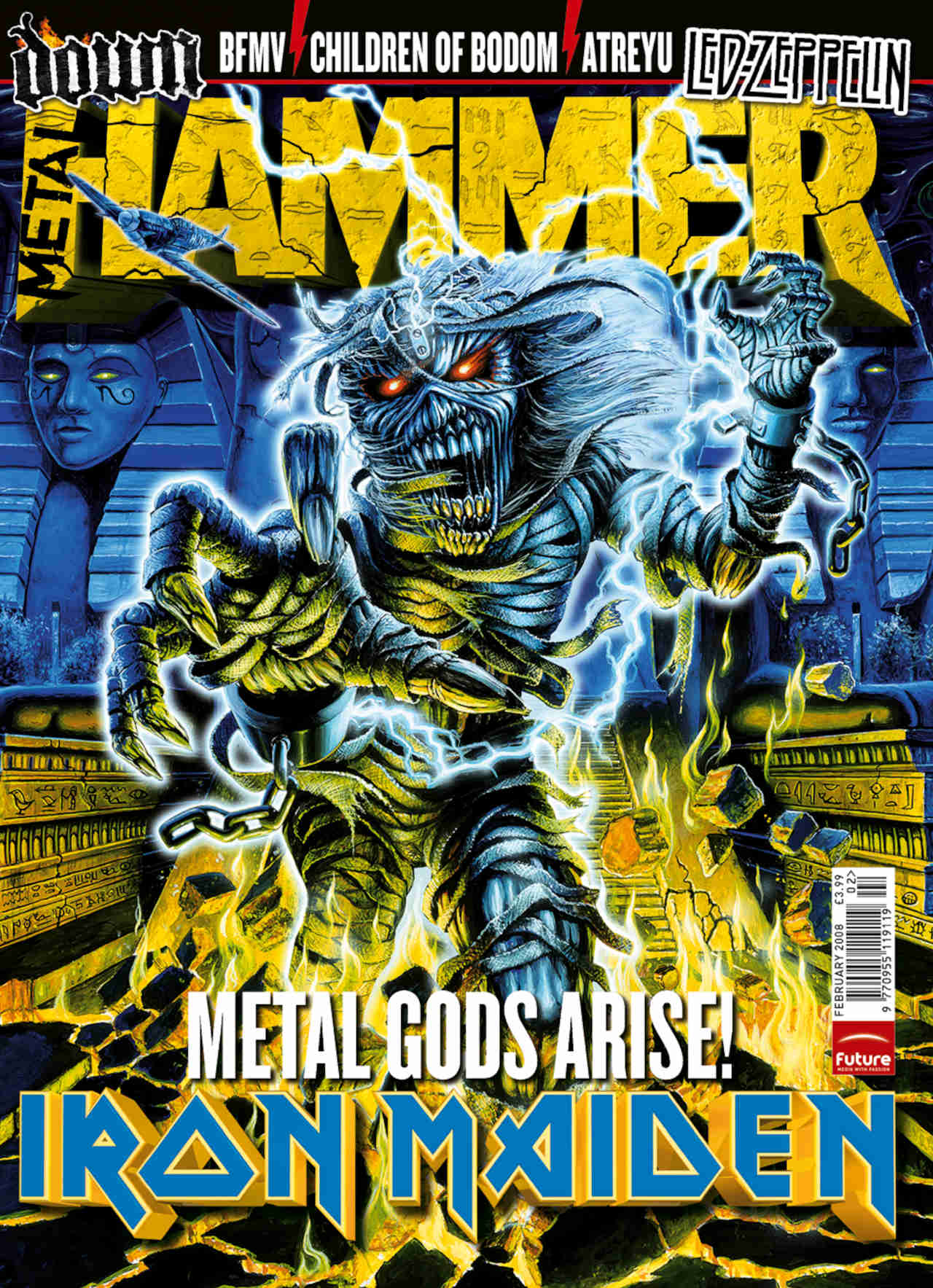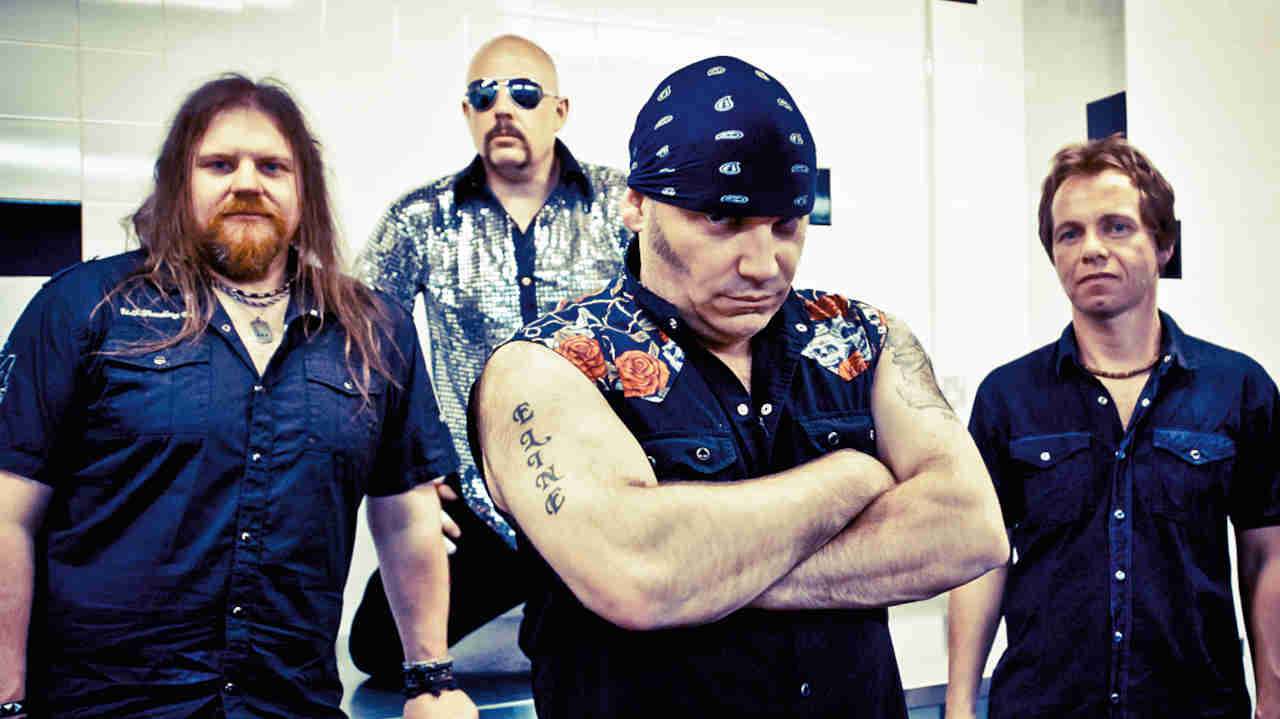Before he replaced Bruce Dickinson in Iron Maiden, Blaze Bayley was the singer in Wolfsbane. The West Midlands four-piece were of the most exciting British metal bands of the late ’80s and early ’90s – Rick Rubin thought so when he signed them to his label, Def American. In 2008, Blaze Bayley looked back on the band’s dizzying rise and the making of their classic 1990 mini-album All Hell’s Breaking Loose Down At Little Kathy Wilson’s Place.

At the end of the 80s, America was the dominant force in hard rock thanks to the massive success of bands such as Bon Jovi, Guns N’ Roses, Poison and Skid Row. Britain had multi-platinum superstars Def Leppard, but there was a big drop off after that.
That’s not to say there weren’t plenty of UK bands ready to take their shot at the big time. The likes of Thunder, Little Angels and Quireboys were the great white hopes of British rock, though they all tailored their sound to the American market to some degree.
But there was one bunch of hopefuls who definitely didn’t coat their rock’n’roll with layers of studio gloss. Roaring out of the West Midlands, Wolfsbane were greasy, funny and raucous - closer to the gutters of their native Tamworth than the sunbaked pavements of the Sunset Strip. In swashbuckling singer Blaze Bayley, they had a charismatic frontman touted in the press as Dave Lee Roth with a British accent, and they had a legion of fans whose nickname summed up the band’s bark-at-the-moon approach: the Howling Mad Shitheads.
“We never saw ourselves as the next big thing,” says Blaze now. “To us, that was media hype. But we had confidence in ourselves. We believed that, given the breaks, Wolfsbane had the potential to go all the way. We’d built up our British fan base from nothing, and felt the same could happen everywhere.”
For a moment, Wolfsbane looked as though they would become the standard bearers for British rock’n’roll. There was a false start involving producer Rick Rubin, but in 1990 they released a mini-album that represented the best British rock had to offer: the brilliantly titled All Hell’s Breaking Loose Down At Little Kathy Wilson’s Place.

Wolfsbane were formed in Tamworth, 15 miles outside Birmingham, in 1983. The first line-up featured Blaze – who decided he wanted to be a singer after seeing Dio at the Birmingham Odeon on the Holy Diver tour – plus guitarist Jase Edwards, bassist Jeff Hateley and drummer Mandy Hemmings. Over the next few years, they cycled through a series of different drummers, all the while looking like Mötley Crüe, if Mötley Crüe lived on a council estate.
By the time of 1988’s Wasted And Dangerous demo, they‘d toned down the image and recruited a new drummer, Steve ‘Danger’ Ellett. They caught the attention of Slayer/Beastie Boys producer Rick Rubin, and they became the first British band to sign to his newly founded Def American label Unfortunately, Rubin sucked the life of the band’s sound, and their debut album, 1989’s Live Fast Die Fast, was a disappointment, lacking the kind of full-force energy Wolfsbane brought to their live shows.
“We ended up hating Rick Rubin,” says Blaze. “He didn’t get what made this band happen, and went one step too far on the production, losing all the power and live feel. So, while there are good things about Live Fast, Die Fast, nonetheless it didn’t represent Wolfsbane.”
Despite their experiences with Rubin, they stuck with Def American. It turned out to be the right decision. Suddenly, the wind seemed to be blowing in Wolfsbane’s favour.
“We got the chance to support Iron Maiden, which was a great break for us,” says Blaze. “I think it came down to a choice between us and The Almighty. From what I’ve been told, it was the video we did for the song I Like It Hot that swung things our way. I reckon that [Maiden bassist and renowned football fanatic] Steve Harris chose us because there was football in that clip!”
Keen to capitalise on the opportunity, Def American felt the band should record a mini-album. There were just two conditions. Firstly, the budget would be tight. Secondly, Rick Rubin would not produce this one.
“If you know Rick, then you’ll understand that he never records anywhere outside of America,” says Blaze. “So, he sent Brendan to England for this record.”

“Brendan” was Brendan O’Brien. These days, he’s known for producing the likes of Pearl Jam, Rage Against The Machine and Korn, but at the time his highest profile job was as engineer on The Black Crowes’ debut album.
“We spoke to him on the phone and he seemed to get what we were about,” says Blaze. “So immediately there was a sense that this could turn out for the best.”
Brendan landed in London and drove straight up to Tamworth for two days of rehearsals. The band put him in a local hotel, The Castle, and then set up their gear for a race against time.
“I remember we used to rehearse in this old, condemned building that was just behind the Stone Cross pub,” says Blaze. “It was a listed building – Grade 3 – so nothing could be done with it. But this really suited us. Immediately, we trusted Brendan. He was such a talented guitarist and vocalist – an all-round top musician – that he came up with some superb ideas. This was far removed from Rubin, who will never be a good musician.”
The band recorded six tracks for the mini-album. Two were already established in the Wolfsbane canon: Loco dated back to one of their early demos, while Paint The Town Red was part of their live set. The others – Steel, Hey Babe, the fantastically -named Totally Nude and Kathy Wilson - were brand new.
Having gone through an intensive pre-production for a mere two days in their condemned rehearsal studio, the band then headed down to London and billeted themselves in Roundhouse Studios, Camden.
“The place had a real vibe about it,” recalls Blaze. “Queen had recorded part of Bohemian Rhapsody there, and AC/DC had done Highway To Hell at the studio as well, so you knew you were in a place where history had been made. To be honest, we felt right at home there, as opposed to Los Angeles, where we’d done Live Fast, Die Fast.”
Little time was wasted in the studio, as everyone involved realised they were up on a tight deadline.
“We piled into our van in the early morning, drove down from Tamworth, arrived at 11am, and were set up by 2pm,” Blaze tells us. “Two hours later, we were getting drum sounds on tape – and that’s all on the first day! Brendan understood what made us happen, and we played through all the songs as if it was live. That’s what Wolfsbane were about and what Rubin failed to appreciate. After that, I re-did the vocals, and Jase dubbed on more guitar. But what you hear on the album is really a band playing live.”
Although there was little breathing room, the band members took the chance to head to the pub across the road whenever the opportunity arose.
“It was quite funny,” says Blaze. “We’d be stone cold sober for the sessions, and then tear over to the pub once we’d finished. During the mixing stage, you’d get one or more from the four of us staggering back to the studio to listen to a mix and saying, ‘Brendan, that’s fucking great!’ I’m not sure if any of us were in a fit state to comment, but he just got on with things… which was just as well.”
Blaze recalls one amusing moment during recording. “There was this shitty little indie band in there doing demos, or the B-sides for their single or something,” he says. “I think they were about to release their first album. We thought nothing of them at the time, but a few years later, I was at an Iron Maiden convention in Brighton, and this drunk bloke came crashing through the crowd, singing the lyrics for [mini-album track] Paint The Town Red in a very slurred manner. He was the fella who sung for that indie lot, and it was actually quite sweet that he remembered Wolfsbane… and that song. Especially when you consider how big they became.”
And who was this drunken singer from “that indie lot”? Damon Albarn from Blur.
While everything in the studio went smoothly – “Given another five days, we could have done a full album,” insists Blaze – the band had to battle with the label over the album title. The song itself was a classic slice of sci-f B-movie-inspired rock, complete with lyrics about alien-related goings on in a small town
“That was my idea,” reveals Blaze. “I’d come up with the lyrics for Kathy Wilson after watching a late-night re-run of the 1953 science fiction movie Invaders From Mars – it was at a time when I wasn’t sleeping very well.
“I thought the title would suit the record perfectly. Now Def American didn’t care at all, but Phonogram, to whom all Def American products were licensed in the UK back then, objected strongly. They hated it. They felt it was too long. We told them: ‘No, there are longer ones. Besides, our fans will understand the humour.’ They also detested the artwork.
“In the end, we got our choice of title, but I do sometimes wonder whether we also lost something as well. Did Phonogram decide that they’d give us our own way, but wrote us off as troublemakers? That is a possibility.”
Blaze believes that the ongoing problems with Phonogram and, by association Def American, were responsible for stunting the band’s growth.
“The budgets were very tight, and they never allowed us to tour in Europe the way that we had in Britain,” says the singer. “We’d really gained our footing over here through live graft. I’m convinced the same thing would have applied in Europe as well – and possibly America – but we never got the chance to find out. It was so frustrating.”
All Hell’s Breaking Loose… was released in October 1990 and reached number 48 in the UK charts – exactly the same position as Live Fast, Die Fast. The difference was that, where the debut failed to capture Wolfsbane’s spirit, the mini-album definitely did. It seemed like they were heading for bigger things.
Sadly, major success didn’t happen. 1991’s Down Fall The Good Guys failed to make the UK Top 50, while 1993’s Massive Noise Injection live album – recorded at fabled London club The Marquee – barely raised an eyebrow. Soon after 1994’s Wolfsbane album, Blaze jumped ship to join Iron Maiden, replacing the departing Bruce Dickinson – something that left his bandmates feeling betrayed.

Blaze’s time in Maiden lasted five years and two albums (1995’s The X Factor and 1997’s Virtual XI) before he was replaced by the returning Dickinson. He subsequently started his own band, Blaze. His former bandmates Jase Edwards, Jeff Hateley and Steve Danger had stuck together under the name Stretch, but that had petered out.
But in 2007, Wolfsbane reunited to play the Rock Of Ages festival in their hometown of Tamworth. Any lingering bad blood has been forgotten. Today, Blaze looks back on the band’s early years with pride – especially All Hell’s Breaking Loose Down At Little Kathy Wilson’s Place, the record which shows Wolfsbane at their very best.
“It’s definitely the one we’re most proud of now,” says the singer. “The record that got closest to representing what we’re all about. It had a great feel, and much of the credit must go to Brendan. I’m not surprised he’s gone on to achieve such major status, producing big names like Pearl Jam, Velvet Revolver and Bruce Springsteen. I’d like to think that working with me is what inspired him to greatness!”
Originally published in Metal Hammer issue 175, January 2008



